
Living with irritable bowel syndrome (IBS) can be deeply challenging, given its unpredictable bouts of abdominal pain, diarrhea, and constipation that disrupt daily activities. Many ask, "Is IBS a disability?" This question is crucial as it impacts eligibility for disability benefits and accommodations under laws the Americans with Disabilities Act (ADA).
At Nudge, we specialize in digestive health supplements and are keenly aware of the challenges those with IBS face. We understand the impact of IBS symptoms on daily life and are committed to supporting our community with knowledge and effective supplements. Our products aim to alleviate what disrupts daily activities and impair quality of life. We stand with those who suffer from this condition, advocating for better awareness and understanding of IBS.
Based on our extensive research, we've compiled a detailed guide to exploring eligibility for disability benefits and how to apply for disability benefits due to IBS. By the end of this blog, you will gain insights into managing severe impairment from IBS, navigating the appeals process, and understanding your employment rights.
Is IBS a disability? Let's delve into this pressing question to provide clarity and support for managing this challenging condition.
Is IBS a Disability?
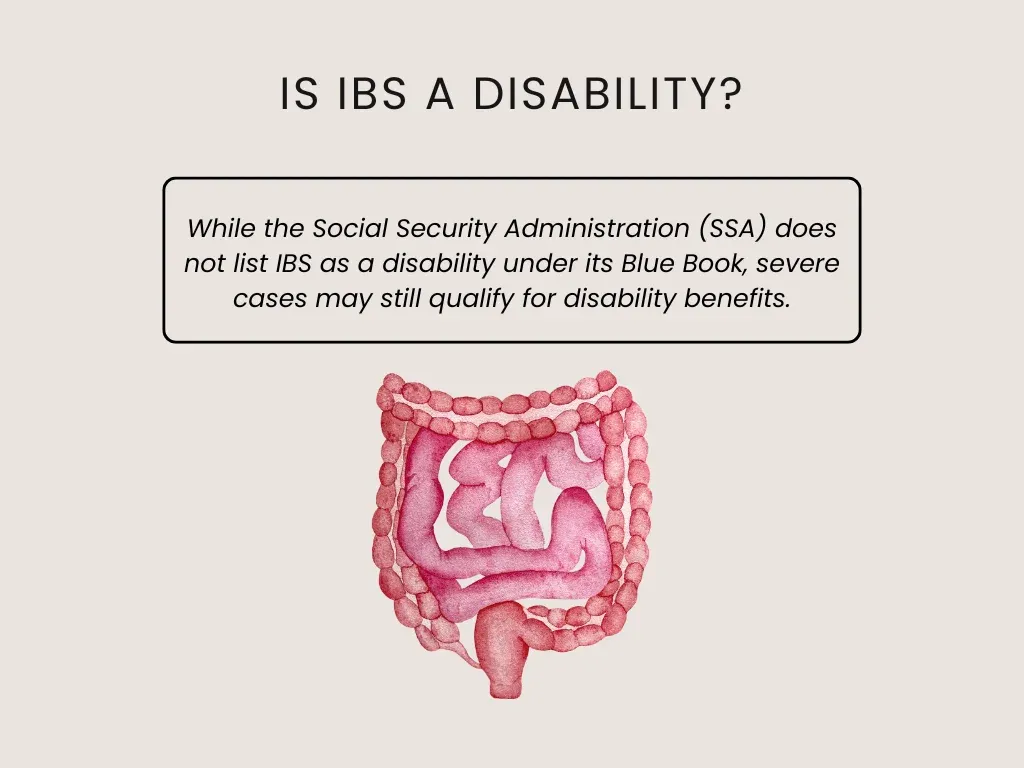
Determining if IBS is a disability depends on its impact on major life activities and one's ability to work. Is IBS a disability? While the Social Security Administration (SSA) does not list IBS as a disability under its Blue Book, severe cases may still qualify for disability benefits.
Under certain conditions, such as severe symptoms that inhibit regular work, IBS can be considered a disability. This recognition mainly comes from understanding the legal and medical criteria set by organizations like SSA and ADA in the United States. It's crucial to gather substantial medical evidence and documentation to support a disability claim for IBS.
Disabling Symptoms of IBS
IBS can manifest with various symptoms that hinder everyday activities, potentially qualifying it as an irritable bowel syndrome disability. These symptoms include:
- Stomach cramps and pains
- Increased gas formation
- Severe bouts of diarrhea or constipation
- Presence of mucus in stool
- A sensation of incomplete bowel movements
- Swelling or obstruction in the abdominal area
IBS affects the digestive system and can influence other bodily functions. Additional symptoms may include:
- Increased need to urinate
- Bad breath, also known as halitosis
- Headaches
- Pain in joints or muscles
- Ongoing tiredness
- Menstrual irregularities
For those struggling with severe symptoms of IBS, it may be considered a disability if it impairs their ability to perform major life activities and work-related tasks. Individuals should seek a free consultation from a disability lawyer to explore their options for claiming Social Security disability benefits or reasonable accommodations under the ADA and SSS.
Types of Irritable Bowel Syndrome (IBS) Disability
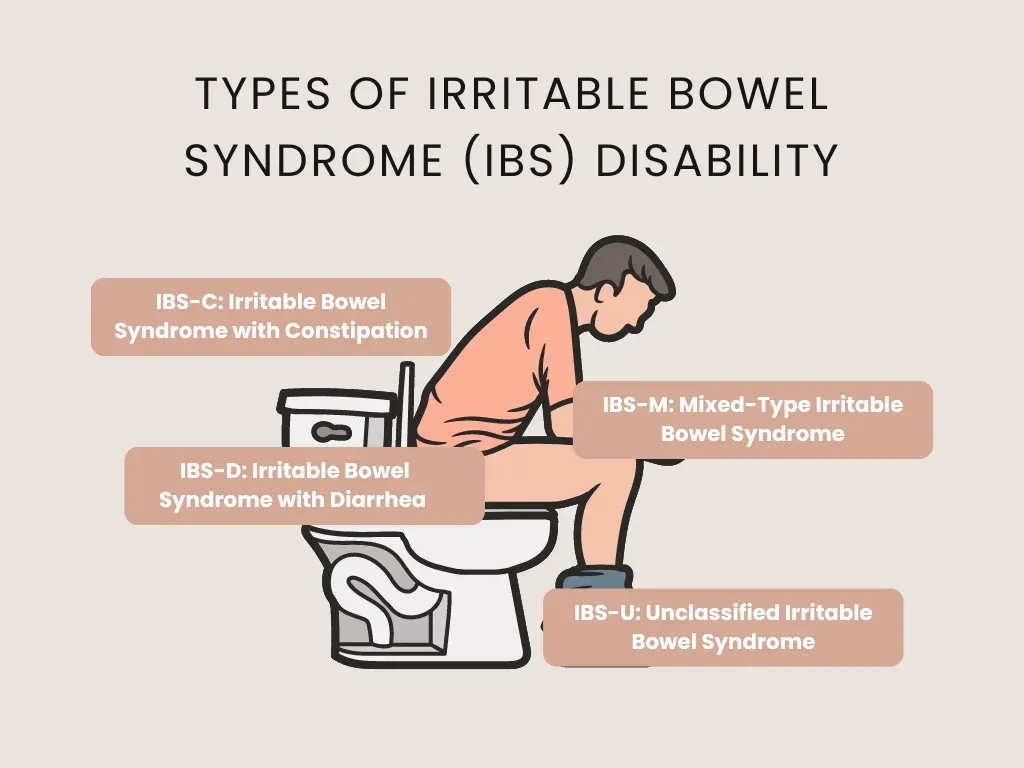
As per the guidelines set by the National Institute of Diabetes and Digestive and Kidney Diseases (NIDDK), a diagnosis of IBS is established when an individual presents with symptoms persisting for a minimum of six months uninterrupted. IBS classification depends on the nature of bowel movement issues experienced by the individual.
Let's delve into the various IBS types that could meet disability criteria:
1. IBS-C: Irritable Bowel Syndrome with Constipation
IBS-C primarily causes severe abdominal pain, bloating, and constipation, posing significant disruptions to daily life. Those affected often experience undue hardship due to the chronic nature of symptoms. In assessing disability, medical records detailing the frequency and severity of these symptoms are crucial.
2. IBS-D: Irritable Bowel Syndrome with Diarrhea
IBS-D, characterized by frequent diarrhea, urgency, and loose stools, can lead to dehydration and severe discomfort. The SSA's primary focus is on its impact on an individual's residual functional capacity—how they perform daily tasks. Documentation from a healthcare provider on how these symptoms prevent normal functioning is essential.
3. IBS-M: Mixed-Type Irritable Bowel Syndrome
IBS-M involves alternating symptoms of diarrhea and constipation, adding unpredictability to one's medical condition. This variability can complicate daily activities and work, making it a potential case for disability insurance. For SSA approval, detailed medical reports on the fluctuation and impact of these symptoms are necessary.
4. IBS-U: Unclassified Irritable Bowel Syndrome
IBS-U includes symptoms that do not consistently align with other types. Patients might experience intermittent signs of irritable bowel syndrome disability, such as cramping in the abdomen, which does not follow a predictable pattern. This unpredictability can exacerbate the difficulty in maintaining employment and performing at work.
Eligibility Criteria for IBS Disability Benefits
Irritable Bowel Syndrome (IBS) often raises questions about eligibility for disability benefits. Understanding the criteria from the Social Security Administration (SSA) and the Americans with Disabilities Act (ADA) is crucial for those affected.
Let's explore the specific requirements for obtaining benefits.
SSA Criteria for Disability
The SSA provides financial assistance to individuals unable to work due to medical conditions. However, IBS alone does not automatically qualify as a disability under SSA standards.
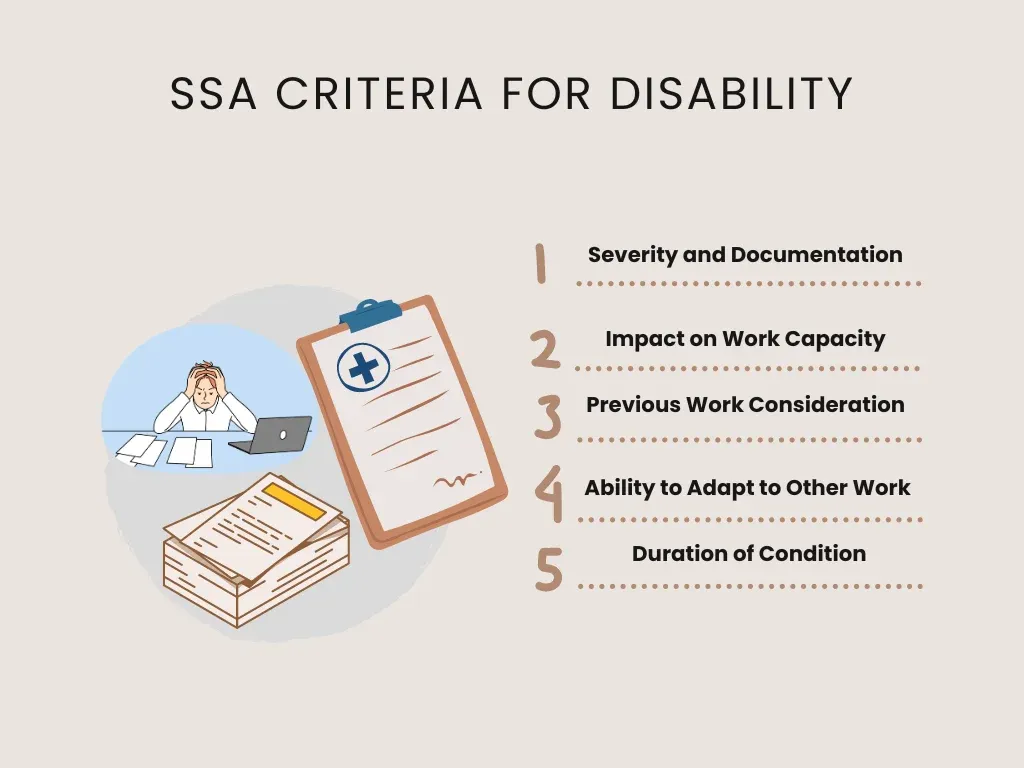
- Severity and Documentation: An individual must demonstrate that IBS symptoms are severe enough to prevent any substantial gainful activity. Medical records and doctors' reports are essential to support this claim.
- Impact on Work Capacity: The symptoms of IBS, such as severe pain and frequent bowel movements, should significantly limit the person’s ability to perform typical work tasks.
- Previous Work Consideration: The SSA examines whether a person can perform the work they have done previously despite their IBS.
- Ability to Adapt to Other Work: If a person cannot perform their usual work, the SSA assesses whether they can adjust to different work based on age, education, and work experience.
- Duration of Condition: The symptoms and limitations must have lasted for at least 12 months or be expected to last for at least 12 months.
These criteria highlight that while IBS is not directly recognized, the effects might still qualify as a disability under SSA guidelines.
ADA Criteria for Disability
The Americans with Disabilities Act (ADA) adopts a broader definition of disability, potentially including IBS if it substantially limits one or more major life activities. The ADA criteria focus on functional limitations rather than specific diagnoses:
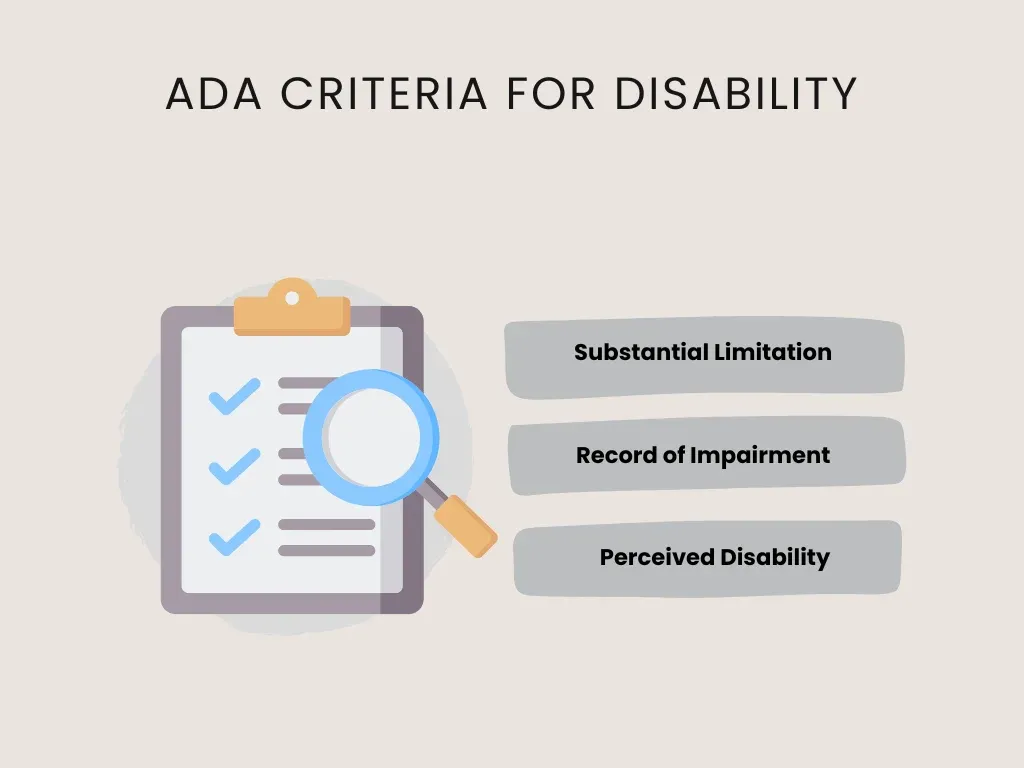
- Substantial Limitation: IBS must significantly restrict major life activities, such as working, learning, or performing manual tasks.
- Record of Impairment: Even if IBS symptoms are intermittent, a recorded history of impairment might meet ADA criteria.
- Perceived Disability: If an individual is treated as having a disability (IBS in this case), they may also be protected under the ADA.
Employers must provide adjustments or modifications to enable people with disabilities to perform their job duties. For IBS, this could include flexible schedules or frequent breaks. The ADA mandates accessibility in the workplace and fair treatment, ensuring that individuals with IBS can work without undue hardship.
IBS is considered a disability depending on specific criteria set by the SSA and ADA. The severity of the condition and its impact on life's significant activities play a critical role in the eligibility for disability benefits. Understanding and meeting these criteria can significantly aid those impacted by IBS in navigating their rights and the support available to them.
How to Apply for Disability Benefits Due to IBS
Applying for disability benefits due to IBS involves a detailed process to ensure your application meets the SSA criteria. Here are five essential steps to guide you through the application process:
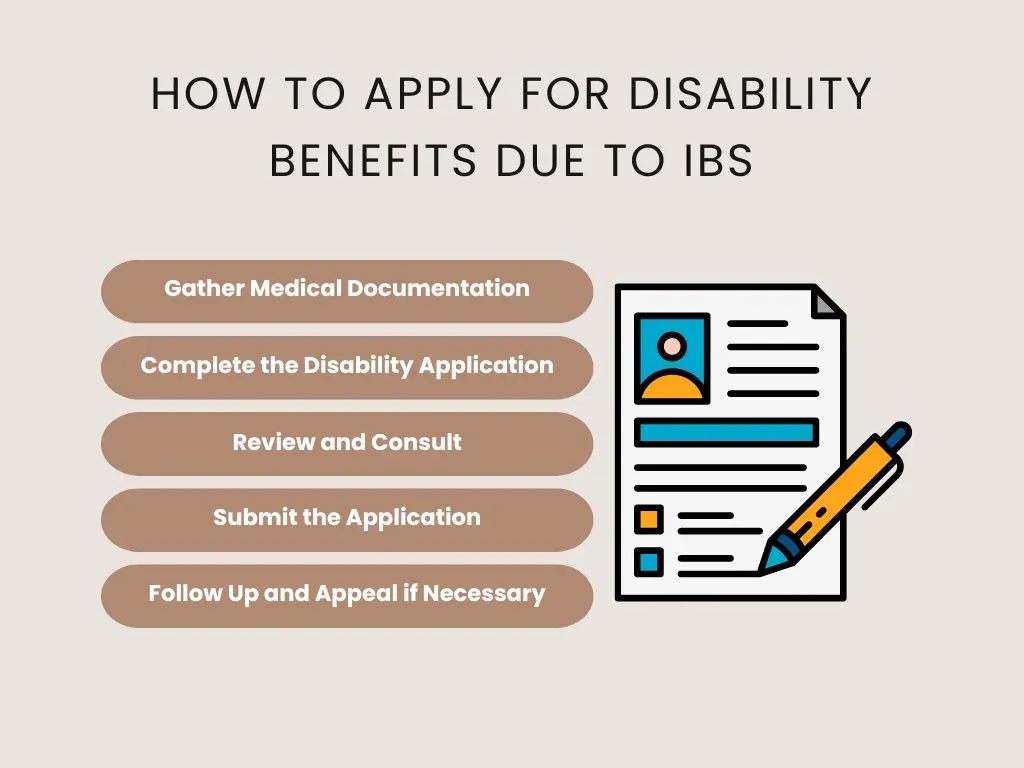
Step 1: Gather Medical Documentation
To apply for IBS disability benefits, ensure you are diagnosed with irritable bowel syndrome (IBS) by a qualified healthcare provider. Collect all medical records that document your IBS disability symptoms and treatments. These documents must demonstrate how your condition limits your daily activities.
Here are the essential medical documents you should gather:
- Doctor’s Diagnosis Report: Confirms that you have IBS and outlines the specifics of your condition.
- Treatment Records: Show the treatments you have undergone for IBS and their effectiveness.
- Impact Statement: Describes how IBS affects your ability to work and perform daily tasks.
- Pharmacy Records: Lists all medications prescribed for managing your IBS symptoms.
- Specialist Consultations: Includes insights from gastroenterologists or other specialists treating your IBS.
After gathering your documents, review them to ensure they reflect the severity of your IBS disability. This detailed documentation will support your claim that irritable bowel syndrome is a disability impacting your life significantly. Prepare to submit these documents with your disability benefits application, detailing how IBS limits your functionality.
Step 2: Complete the Disability Application
When applying for disability benefits due to irritable bowel syndrome (IBS), it's crucial to understand the criteria under both the ADA and SSA. Start by completing the application forms provided. For SSA benefits, focus on illustrating how IBS significantly limits your ability to perform work tasks. Highlight any severe symptoms, like chronic pain and frequent, urgent restroom needs that impact your job performance.
For ADA accommodations, document how IBS affects your daily activities and request necessary adjustments to maintain work efficiency. Submitting a well-documented application to the SSA and ADA increases your chances of receiving the appropriate support and benefits for your condition. It's also advisable to seek guidance from legal professionals or advocacy groups specializing in disability rights to strengthen your application.
Step 3: Review and Consult
Before submitting your application, review all your gathered medical documentation on irritable bowel syndrome (IBS). Consult with healthcare professionals to ensure every document reflects the severity of your IBS disability. This thorough review strengthens your application for disability benefits due to IBS.
Consulting with a disability attorney might also be beneficial. They can offer guidance on how the Social Security Administration (SSA) and the Americans with Disabilities Act (ADA) view IBS disability. An attorney can help tailor your application to meet specific criteria, ensuring your case is as strong as possible.
Finally, confirm all details are accurate and complete. Double-check that your application clearly shows how IBS disability affects your daily life and work capabilities. This comprehensive and precise preparation is crucial for moving forward with your application for disability benefits due to IBS.
Step 4: Submit the Application
Compile the completed application forms and your medical documentation into one package, ensuring all information is accurate and thoroughly filled out. Be sure to attach the medical documentation you collected that supports your IBS disability. Double-check that the application includes all required details about your irritable bowel syndrome disability.
Here are the key steps for submitting your application:
- Review for Accuracy: Ensure all sections are correctly filled out and no required information is missing.
- Attach Medical Documentation: Include all relevant documents proving your IBS is a disability.
- Submit Online or by Mail: To expedite processing, check if you can submit your application online or by mail.
- Keep Copies: Always keep copies of your submitted application and all accompanying documents for your records.
Once you apply, monitor its status and prepare to respond to any queries. The agency may request additional information to confirm that your IBS disability warrants benefits. Be prompt and thorough in your responses to facilitate a smoother review process.
Step 5: Follow Up and Appeal if Necessary
After submitting your application for disability benefits due to IBS, following up is crucial. Contact the organization's office to confirm they received your documents and to inquire about the review process timeline. Regular follow-ups keep your application visible and allow you to provide any additional information needed promptly.
Here are the key actions you should take during this phase:
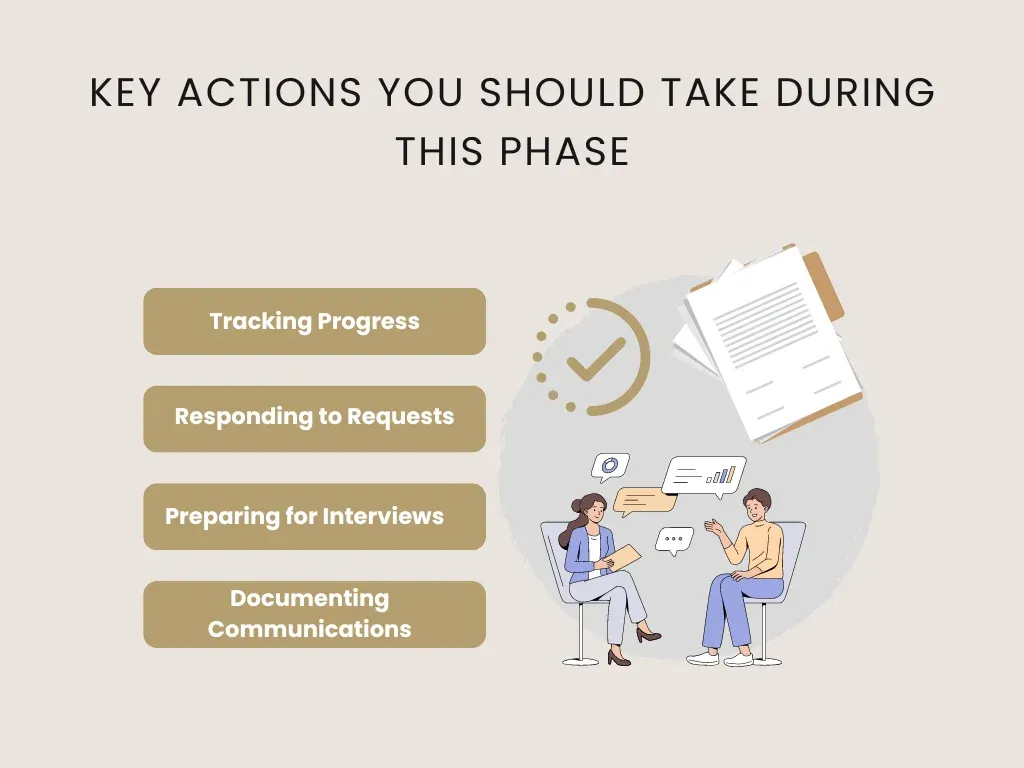
- Tracking Progress: Regularly check the status of your application either online or by calling the relevant office.
- Responding to Requests: Quickly address any requests from the disability office for further documentation or clarification regarding your IBS disability.
- Preparing for Interviews: If an interview is required, be ready to discuss your condition and how it affects your daily life.
- Documenting Communications: Keep a log of all communications with the disability office, including dates, names, and the details discussed.
If your application for IBS disability benefits is denied, prepare to appeal. Start by gathering any additional evidence demonstrating how IBS is considered a disability in your case. Submit your appeal within the given timeframe, ensuring you meet all procedural requirements for successfully reconsidering your case.
Frequently Asked Questions
Many individuals have common queries regarding the intersection of IBS and disability. Let's delve into these frequently asked questions to shed light on this important topic.
Can I Work with IBS and Still Receive Disability Benefits?
Yes, you can work with IBS and still receive disability benefits. The key factor is proving that IBS significantly impairs your ability to perform job-related tasks. You need to provide medical documentation and evidence showing that IBS symptoms like severe pain, diarrhea, and fatigue prevent you from maintaining employment. If you meet the disability criteria, you can qualify for benefits even while working part-time or in a modified role.
How Long Does It Take to Get Disability Benefits for IBS?
The process to get disability benefits for IBS can take several months to over a year. After submitting your application, the SSA reviews your medical records and work history. The initial review can take 3-5 months. If your application gets denied, you can appeal the decision, extending the timeline significantly. Ensuring your application is thorough and well-documented can help speed up the process.
What if My Application Is Denied?
If the SSA denies your application, you can consider submitting an appeal. The appeal process has four levels:
- Reconsideration
- Hearing by an Administrative Law Judge
- Review by the Appeals Council
- Federal Court Review
Start with requesting a reconsideration, where a new examiner reviews your case. If denied again, you can request a hearing. Additional medical evidence and detailed documentation can strengthen your case throughout the appeals process.
Key Takeaway
Irritable bowel syndrome (IBS) can significantly impact daily life, often leading to ask, is IBS a disability? While not all cases qualify as a disability, severe forms of IBS that disrupt routine activities might qualify as one. Understanding whether your symptoms meet the criteria for an irritable bowel syndrome disability impacts your eligibility for support and benefits.
Integrating supplements like the best probiotic vitamins for those managing IBS can offer relief and improved gut health. Consider taking an IBS quiz to identify possible IBS and its types. Knowledge about your condition empowers you to take proactive steps towards better health and well-being, making managing symptoms more effective.
Is IBS a disability in your case? Consider Nudge if you're seeking a natural way to manage your symptoms. Our all-in-one supplement targets the three root causes of SIBO, focusing on gut motility disorders, core nutrition, and stress without needing a prescription. Nudge helps you explore your options and provide proper support via contact@nudgehealth.co.